Early Career Award
The BCI Society Early Career Award
After exciting editions of the BCI Society Early Career Award (ECA) in 2020, 2021, and 2023 the BCI Society is now pleased to announce ECA 2024. The ECA recognizes an early career scientist for outstanding work that advances the BCI field, in the biological, methodological, and/or translational aspects thereof. More specifically, the ECA 2024 will recognize an individual or individuals who have contributed significantly to i) an understanding of brain structure/function, and/or brain signals related to BCIs, and/or ii) scientific progress of BCI research through development of algorithms, software and/or hardware related to BCIs and/or, iii) BCI application or end-user-oriented research. Nominees must have a history of scholarly work that has advanced the field. The ECA will be presented in early 2025.
Evaluation
Applications will be reviewed by jurors appointed by the BCI Society Awards Committee.
Please note, this year’s BCI Society Awards Committee and the Jury will have the authority to hand out one, two, or no award, depending on the submitted nominations. Jurors will be requested to consider diversity (including gender, geography, topic of research) when making their recommendation.
Juror Selection
The Awards Committee is now seeking regular BCI Society members willing to serve on the jury and evaluate the nominations for ECA 2025 awards. In this search, the Committee aims to form an inclusive jury considering factors such as topic, gender, and geography. Interested jurors are invited to send an email to the BCI Secretariat below.
Application information
An eligible candidate for the 2025 ECAs:
- Is a member-in-good-standing of the BCI Society;
- Is within 10 years of earning their first terminal degree (MD or PhD). Thus, researchers with less experience, including postdocs, are also eligible. The BCI Society Awards Committee will give special considerations for breaks for parenting leave, medical leave, or military service;
- Must accept the nomination;
- Must agree to provide the Society with the following if s/he wins the award:
- A picture and a brief biosketch, highlighting contributions to the BCI field;
- A short talk at the next BCI Meeting (June 2027).
Applications for the Early Career Award must include the following:
- Nomination form, which includes a half-page summary of why this nominee deserves an award;
- An updated CV of the nominee (5 pages max) in the format of the NIH biosketch (https://grants.nih.gov/grants/forms/biosketch.htm; ERA Commons number not required). ). The personal statement should highlight the applicant’s accomplishments and contributions to the BCI field.
- Two letters of recommendation (maximum one page) from people other than the nominator;
- If applicable, an up to one-page summary of the special considerations (such as for military service, parenting leave, or medical leave) that explain why the nominee should be considered for more than ten years after the first terminal degree.
Please use only pdf formatting for these documents.
Important for nominators:
- The nominator must be a regular member of the BCI Society in good standing;
- Self-nominations are allowed;
- Members of the BCI Society Board or Awards Committee may not be nominated;
- Each BCI Society Member may nominate a maximum of two persons.
ECAs will be presented in early 2026.
2024 Recipient
Marie-Constance Corsi
NERV team, Inria, Paris Brain Institute
2023 Recipient
University of California, Davis
2021 Recipients
Camille Jeunet
Aquitaine Institute for Cognitive and Integrative Neuroscience, Univ. Bordeaux & CNRS, France
Frank Willett
Neural Prosthetics Translational Laboratory, Stanford University, USA
2020 Recipient
Sebastian Halder
Lecturer, University of Essex
How to Submit
Applicants must submit the required materials directly to Cendrine De Vis via email with the subject line: BCI Early Career Award Nomination
Applications will be accepted until October 31 at 11:59pm Central Daylight Time.
